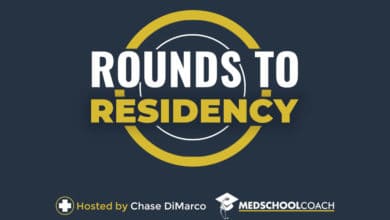Dr. Greg Rodden talks about how to handle anxiety on your first day of residency, build relationships with hospital staff, and how and when to prepare for your step 3 exams.
- [01:20] What to Prepare for in Your First Day of Residency
- [08:51] Are sub-internships important?
- [11:20] How to create and build relationships with your other team members
- [15:48] How to Handle Your First Day in a Clinic or a Hospital
- [19:20] Educational Material to Utilize While Working Full-time
- [21:24] How to Prepare for Your Step 3 Exams
Chase DiMarco talks to Dr. Greg Rodden, a second-year pediatric resident in Austin, Texas, and a passionate tutor with MedSchoolCoach. This episode makes up part two of our previous episode. They talk about how to handle anxiety on your first day of residency, build relationships with hospital staff, and how and when to prepare for your step 3 exams.
What To Prepare For In Your First Day of Residency
After all the hard work, dedication, and persistence, you’re finally here. You’re finally a resident doctor. The flip side is that the first day or week will be overwhelming. Everything will be new and complicated, and it will feel like it all just got so real, so fast. If you went through medical school figuring out stuff on your own, you’d have a culture shock because residency is all about collaboration. Seeking help and depending on your senior residence to guide you is the only way you’ll get through it all. And that’s where attitudes come in. Develop an attitude of wanting to learn and be humble enough to let other people help, especially the nurses. A nurse or a specialist will give you insights into hospital operations that aren’t taught in schools.
Are Sub-Internships Important?
While some people become doctors before going through sub-internships, it always helps when you’ve got all the experience you can possibly gain before residency. Sub-internship is the step below residency and above regular clinical rotation. It provides you with the opportunity to show off your skills and build your confidence before residency. However, most students make the mistake of enrolling in fields they know they won’t major on. It’s simply a waste of time because, as you probably already know, medical fields can be related, but they are not the same.
Create and Build Relationships with Your Other Team Members
The first few weeks of residency will be hectic since you’ll be trying to learn the ropes of how the hospital runs and taking care of your patients. This might result in you not having enough time to socialize with other members of staff. However, you can start by striking conversations with your immediate circle, such as the nurse taking care of your patient. Furthermore, whenever you have time, say in the afternoons, try and interact with people and build connections. The thing to note here is that hospitals are small places, and you’re bound to know and interact with people whether you like it or not.
Educational Material to Utilize While Working Full-Time
Medics are lifelong learners, and although there will come a time when you’ll feel like you don’t have the time to read a book, there are other ways you can still learn. Some hospitals will give you materials on how they operate, but the best way to learn is always hands-on practice. Every time you get a chance to learn something new, utilize that opportunity to the best of your ability. You’ll find that you’ll only get one chance to interact with some rare illnesses, so it would be best if you took the opportunity with open arms.
If you’re also worried about your step 3 exams, you need to get them done as soon as possible. If you’re still in your fourth year, now is the time to get it done. You are obviously worried about the workload, but the questions and case scenarios are almost the same as with step 2. The only difference is that this time you will be tasked with managing patient problems in a simulated environment.
Check out the White Coat Investor and Find a Rotation
Sign up for a Free Coaching session with Chase DiMarco, sponsored by Prospective Doctor! You can also join the Med Mnemonist Mastermind FB Group today and learn more about study methods, memory techniques, and MORE! Do check out Read This Before Medical School. Like our FreeMedEd Facebook page and find our Medical Micro Course, Blog posts, and Podcasts at FreeMedEd.org! Feel free to Email any Questions or Comments.
Read more about best COMLEX tutoring
